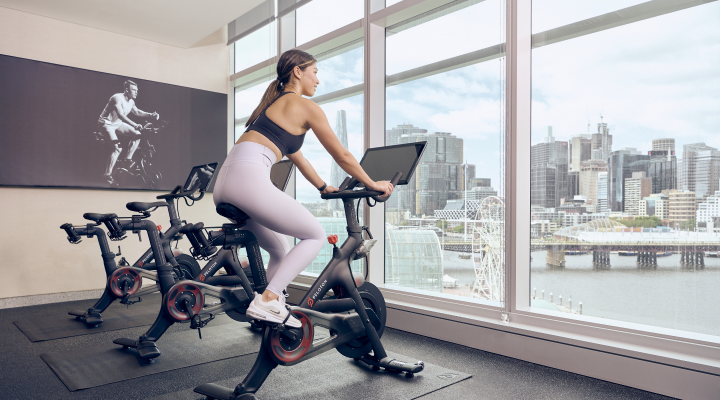Fitness and technology platform Peloton has expanded its operations aggressively since launching in Australia last year – from opening showrooms around the country, to the release of its gaming-inspired workout experience, Lanebreak. And earlier this month, the business launched its commercial operations Down Under, with its range of smart stationary bikes appearing in hundreds of venues along the east coast of Australia. “[We] launched in Australia in July 2021, and in that time, businesses
nesses have continued to tell us about the importance of wellness to their guests, employees and residents,” Betsy Webb, Peloton’s vice president of commercial told Inside Retail.
“We’re always looking for new ways to make it easier for people to be a part of the Peloton community, and our commercial team in Australia are just getting started.
“Focusing on the hospitality industry allows us to build on Peloton’s strong foundation working with resort and hotel properties, [and] we’re excited at the opportunity to work with new business partners in Australia.”
According to the business, using their membership on the road is an important part of the Peloton experience for some of its customers. Users are able to log in to their own account on multiple bikes, provided each bike has an active subscription.
Sofitel Sydney Darling Harbour owner Dr Jerry Schwartz said the hotel prides itself on creating premium experiences for its guests, especially as more Australians prioritise their health and wellness.
“Peloton’s bikes are an excellent way to not only increase our guests’ enjoyment and endurance within our gym, but we’ve also commenced a service where guests can request a Peloton Bike for their room so they can work out at a time, place and pace that suits their individual needs,” Schwartz said.
Peloton’s commercial operations initially kicked off in 2017 in the US, and now extends to more than 6,000 sites across the US and Australia, as well as the UK, Canada and Germany: from hotels, to commercial gyms and offices, as well as luxury rental properties.
In the US, Peloton members have logged over 1 million hours of workouts in hotel locations, and 6 million members said they’re more likely to book accommodation if it has access to the brand’s bikes, opening hotel operators up to new potential guests.
“Our community tells us that accessing Peloton on the road is valuable to them for keeping up their health and fitness routines and staying connected to other Peloton members,” Webb said.
Riding the at-home workout wave
Founded in 2012, Peloton is focused on providing high quality at-home workouts, enabling the business to perform well throughout the pandemic. In the past year, the business’ global membership has jumped from 4.4 million to 6.6 million.
And, though the business had a difficult start to the year, with its stock plummeting below its 2019 IPO price in January due to an unfortunate use of the product on And Just Like That, the home workout industry at large is poised to grow at an annual rate of 1.4 per cent to US$2.1 billion over the next five years, according to IBISWorld.
Some analysts expect Peloton’s hardware sales to taper, but see significant opportunities in its digital app membership, which offers users a similar experience using a different stationary bike.
However, Peloton has been building experiences only available on its own hardware, such as the recently revealed Lanebreak, a competitive workout experience inspired by video game classics.
Using the Peloton stationary bike’s screen, riders move through digital tracks and earn points based on doing the right thing at the right time: accelerate while on a yellow track, keep pace on a blue track, and switch between multiple lanes.
“It gives both new and existing members a chance to level up their training, whilst experimenting with this new gaming-inspired fitness content with dedicated music, for a fun and interactive cardio workout,” Peloton’s senior director of product David Packles told Inside Retail.

